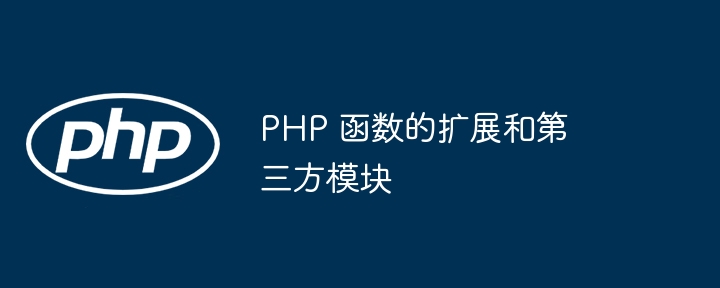Home >Backend Development >PHP Tutorial >Extensions and third-party modules for PHP functions
Extensions and third-party modules for PHP functions
- 王林Original
- 2024-04-13 14:12:011103browse
To extend PHP function functionality, you can use extensions and third-party modules. Extensions provide additional functions and classes that can be installed and enabled through the pecl package manager. Third-party modules provide specific functionality and can be installed through the Composer package manager. Practical examples include using extensions to parse complex JSON data and using modules to validate data.

Extensions of PHP functions and third-party modules
Extended PHP functions
PHP provides many built-in functions, but sometimes we need more Complex or domain-specific functions. Here we can use extensions to extend the functionality of PHP. An extension is a library that can be loaded when PHP is running and provides additional functions, classes, and constants.
To install an extension, you need to use the pecl package manager. For example, to install the json extension, you can use the following command:
pecl install json
After installation, you need to enable the extension in php.ini. Open the php.ini file and add the following lines:
extension=json.so
Practical case: Parsing JSON data using extensions
We can use the json_decode() function to decode the JSON string into PHP array. However, if the data is too complex or requires additional parsing capabilities, you can install the ext-json extension and use the json_decode_ext() function to extend the parsing capabilities.
<?php
$json = '{"name":"John Doe", "age":30, "address":{"city":"New York"}}';
// 使用内置的 json_decode() 函数
$data = json_decode($json);
// 使用 ext-json 扩展的 json_decode_ext() 函数
$data = json_decode_ext($json, true); // 参数 true 启用关联数组
// 访问复杂数据
$city = $data['address']['city'];
?>Third-party modules
In addition to extensions, third-party modules can also be used to extend the functionality of PHP. Modules are typically smaller libraries or frameworks that provide specific functionality. Similar to extensions, we can use a package manager such as Composer to install modules.
To install a module, use the following command:
composer require vendor/package-name
Practical case: using modules to verify data
We can use the symfony/validator module to verify the data. It provides rich validation rules and constraints to make data validation easier.
<?php
use Symfony\Component\Validator\Validator\ValidatorInterface;
use Symfony\Component\Validator\Constraints as Assert;
// 创建一个验证器
$validator = ValidatorInterface::createValidator();
// 创建约束集
$constraints = new Assert\Collection([
'id' => new Assert\NotBlank(),
'name' => new Assert\Regex([
'pattern' => '/[A-Za-z]+/',
]),
]);
// 验证数据
$data = ['id' => 123, 'name' => 'John Doe'];
$violations = $validator->validate($data, $constraints);
if ($violations->count() > 0) {
// Handle validation errors
}
?>By extending PHP functions and using third-party modules, we can significantly extend the functionality of PHP, allowing it to handle more complex tasks.
The above is the detailed content of Extensions and third-party modules for PHP functions. For more information, please follow other related articles on the PHP Chinese website!

